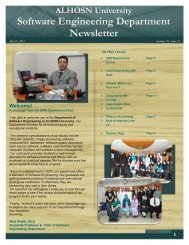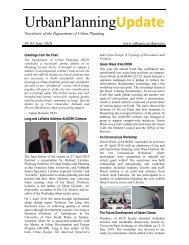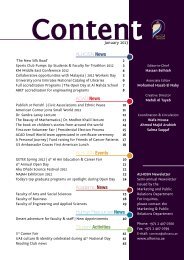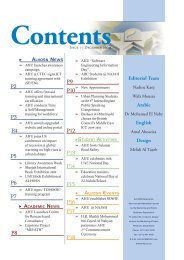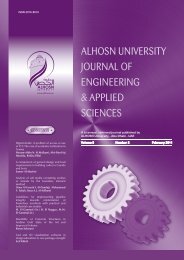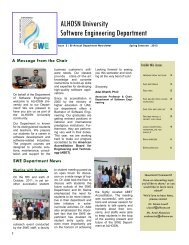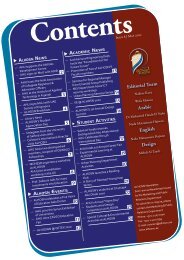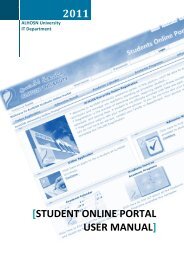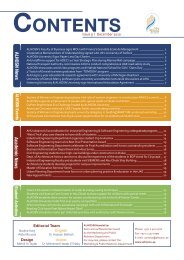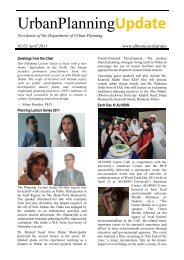ALHOSN University Catalogue Global Knowledge with Local Vision ...
ALHOSN University Catalogue Global Knowledge with Local Vision ...
ALHOSN University Catalogue Global Knowledge with Local Vision ...
You also want an ePaper? Increase the reach of your titles
YUMPU automatically turns print PDFs into web optimized ePapers that Google loves.
Department of Software Engineering<br />
Overview<br />
Software engineering (SE) is a profession dedicated to designing, implementing, and modifying<br />
software so that it is of higher quality, more affordable, maintainable, and faster to build. It is a<br />
"systematic approach to the analysis, design, assessment, implementation, test, maintenance and reengineering<br />
of a software by applying engineering to the software". SE applications are used in a wide<br />
range of activities, from industry to entertainment. Software applications improve user productivity<br />
and quality of life.<br />
Bachelor of Science in Software Engineering (BSSE)<br />
Goals<br />
The main goal of <strong>ALHOSN</strong> <strong>University</strong> Software Engineering program is to offer to its students a<br />
wide education that will enable them to apply the principles of computer science, design, engineering,<br />
management, mathematics and other disciplines to solve engineering problems. Our Program offers a<br />
challenging undergraduate program that prepares graduates for the present and future demands and<br />
challenges of the software industry. The goals can be summarized as follows:<br />
1. Help students in attaining software engineering positions in a chosen field.<br />
2. Provide a solid foundation that will allow graduates to adapt effectively in a quickly<br />
changing field.<br />
3. Prepare students to pursue education at the graduate level.<br />
Objectives<br />
Regardless of the fact that the field is rapidly changing, Software Engineering still has solid based<br />
objectives. Students who graduate from software engineering are expected to:<br />
1. Excel in the practice of software engineering and understand engineered systems in terms of<br />
the relevant fundamental principles of mathematics, science and engineering;<br />
2. Effectively communicate in the workplace and demonstrate the ability to identify, analyze<br />
and solve engineering problems and specify, design, and test, engineering systems, processes or<br />
products;<br />
3. Obtain professional skills, and recognize the need for engaging in life-long learning; and<br />
4. Have the necessary qualifications for employment in software engineering and related<br />
professions, for entry into advanced studies, and for assuming eventual leadership roles in their<br />
profession.<br />
While we consider these objectives to be adequate, we are planning to reevaluate them<br />
continuously in terms of feedback from our principal communities: faculty members and students.<br />
Students’ committees will provide short-term evaluation of the curriculum. The faculty members<br />
that constitute the program’s Advisory Board supply a more strategic perspective. The program’s<br />
Advisory Board meets once a year to review the current status and to both initiate and evaluate<br />
changes to the curriculum.<br />
Outcomes<br />
The Software Engineering program outcomes are nearer term goals. By the time of their graduation,<br />
all students in the software engineering program will have demonstrated the ability to:<br />
1. Apply knowledge of mathematics, science, and software engineering.<br />
2. Design and conduct software projects, as well as to analyze and interpret data.<br />
3. Design a computer system, component, or process to meet desired needs <strong>with</strong>in realistic<br />
constraints such as economic, environmental, social, political, ethical, health and safety,<br />
manufacturability, and sustainability.<br />
4. Function on multidisciplinary teams.<br />
5. Identify, formulate, and solve software engineering problems.<br />
6. Understand software professional and ethical responsibility.<br />
134




